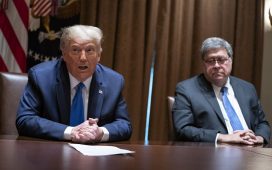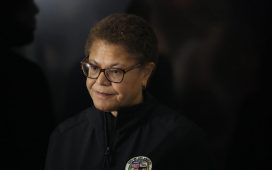“The No. 1 responsibility of an embassy and an ambassador is to ensure the safety of a U.S. citizen on foreign soil,” he said. “This is not just another piece of business to be checked off.”
Emanuel’s remarks came in answer to a question from Republican U.S. Sen. William Hagerty of Tennessee, the home state of Kelly and the site of Nissan’s biggest assembly plant in the U.S. and the Japanese carmaker’s North American headquarters. Hagerty was also the U.S. ambassador to Japan at the time of Kelly’s arrest in November 2018, when Japanese prosecutors picked him up in a coordinated swoop along with former Nissan Chairman Carlos Ghosn .
Under Hagerty’s watch, Kelly was released on bail in December 2018 after a month in a Tokyo jail, but Hagerty resigned from the post in 2019 to run for the senate in 2020.
“National interest”
Hagerty said Kelly’s case is a “matter of critical national interest” for the U.S. The senator also called Kelly’s battle a “real impediment” to relations between the two countries and said he had lodged a formal complaint about Japan’s handling of the case with the prime minister’s cabinet.
Kelly’s trial started in September 2020, and a verdict isn’t expected until March.
Tokyo prosecutors wrapped up their case against Kelly last month and asked for a two-year lockup. Kelly’s defense team makes its closing argument on Oct. 27.
After that, the matter rests in the hands of the three-judge panel.
The question facing judges is whether Kelly was part of an under-the-table effort to hide nearly half of Ghosn’s supersized compensation and pay it out to him later.
The case
Prosecutors allege Ghosn, 67, and Kelly, 65, hid some 9.3 billion yen ($84 million) in postponed compensation from 2010 to 2018. Both men, arrested the same day in 2018, deny any wrongdoing. But after Ghosn fled Japan for Lebanon in 2019, Kelly, his longtime American human resources chief and a former director on the board, was left to fight the charges alone.
Kelly readily admits Ghosn took a massive pay cut – to the tune of around half his salary – in 2010 when Japan’s financial disclosure rules changed. According to Kelly, Ghosn feared that if the true scale of his Nissan paycheck were known, he would face withering backlash in France.
But prosecutors allege Nissan made a deal to pay back that salary shortfall – the amount Ghosn would have earned had he not taken the pay cut – thereby illegally skirting disclosure rules. Kelly counters there was nothing to disclose, partly because no retirement deal was every finalized.
The defense also argues that Kelly was working on a retirement package to be paid in retirement for work done in retirement. As such, the defense maintains, there would be no obligation to disclose the payout – and the charges would be moot. The pay cut Ghosn took, referred to as a shortfall by Kelly, only served as a frame of reference for Ghosn’s expectations.
Hagerty said the evidence shows no crime was committed and that Kelly was wrapped up in a corporate coup by Nissan executives trying to block Nissan’s further integration with its French partner Renault. He criticized the arrest and the drawn-out trial as damaging “Japan’s brand.”
“This is a terrible message to send to the rest of the world,” Hagerty said. “And it’s devastating to any American who happens to get caught in this system. With this type of justice system, I fear American executives will start thinking twice about doing business in Japan.”







